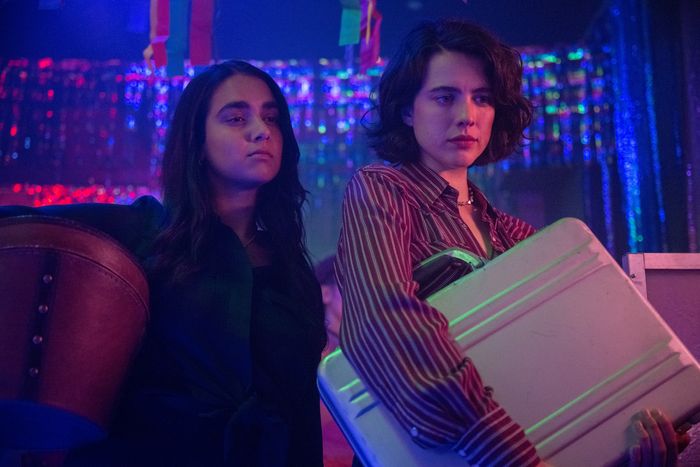
This review was published on February 23, 2024. Drive-Away Dolls is now streaming on Peacock.
Joel and Ethan Coen made 18 movies together as a sibling director team, beginning with Blood Simple in 1984 and ending with the 2018 western anthology The Ballad of Buster Scruggs. They’ve directed one scripted feature apiece since their filmmaking divorce, and while both are pretty good, the most interesting thing about these solo ventures has been what they suggest about the elements each man contributed to the shared Coen sensibility. Joel Coen’s stark 2021 The Tragedy of Macbeth takes place in such an intensely concentrated version of the purgatorial realities so much of the brothers’ work was set in that its characters felt like they were born into their respective dooms without needing to make any choices. Ethan Coen’s new lesbian road-trip comedy, Drive-Away Dolls, in contrast, is all loose-limbed goofiness without a hint of weight, leaving the whole enterprise in danger of wafting away in the breeze. The brothers are individuals who are free to pursue their separate creative interests despite the grumblings of entitled film critics, but make a double feature of these titles and you start to feel like they balanced each other out in ways they haven’t yet corrected for.
Drive-Away Dolls is based on an early-aughts screenplay that Ethan Coen wrote with Tricia Cooke, who, in addition to being his wife and frequent collaborator, is a filmmaker herself. The film is set in 1999, primarily because it’s drawn from the experiences Cooke, who’s queer, had in lesbian bars around that time. Margaret Qualley, leaning into a southern accent and seriously channeling her mother, plays Jamie, a voluble free-wheeler with a history of romantic troubles and an extremely loose relationship with sexual fidelity. Geraldine Viswanathan is her uptight bestie, Marian, who works an office job, reads Henry James, and hasn’t been with anyone since the end of her last relationship, which was years ago. When Jamie’s cop girlfriend, Sukie (a very funny Beanie Feldstein, who lowkey steals the show), finds out about her latest extracurricular activities and kicks her to the curb, she decides to get out of town for a while. Conveniently, Marian has separately decided to do the same by driving to see her aunt in Tallahassee.
Jamie co-opts the trip and suggests they save some money by taking a driveaway deal, promising to deliver their rental car to an agreed-upon destination in exchange for a free ride. A misunderstanding at the rental place lands them in a car that was supposed to be picked up by a group of gangsters (Colman Domingo, Joey Slotnick, and C.J. Wilson) who are planning on using items hidden in the trunk for blackmail, though the women initially have no idea. Drive-Away Dolls is, at times, reminiscent of Raising Arizona in its madcap spirit and the ineptitude of its criminals, and at other times it brings to mind The Big Lebowski, especially in the psychedelic interludes that eventually feature Miley Cyrus in a cameo role. It’s not nearly as good as either, though it’s just fizzy enough to sustain itself for a jaunt down the Eastern seaboard, or, barring that, an 84-minute runtime. Still, one senses this is a mundane story that’s trying to be something stranger and more buoyant — the film’s off-kilter sensibility keeps threatening to fade away, like it’s stuck at the tail end of a high.
There’s a make-out party involving a college soccer team, a stop by a rural honky-tonk, and an appearance by Matt Damon as a conservative congressman whose terror of being exposed for hypocrisy feels downright nostalgic in our current no-consequences era. But the heart of the film, as much as it has one, is the halting slide of Jamie and Marian from pals to lovers. Qualley and Viswanathan are both wildly likable actors who have no sexual chemistry to speak of together, though in this case that feels appropriate. After all, Jamie likes to have sex and isn’t inclined to monogamy, and it’s implied Marian has been harboring feelings for her buddy and comes across as a one-woman kind of gal. Drive-Away Dolls seems to want to be romantic but instead manages a slightly-too-believable portrayal of two friends who enter into a doomed relationship because of timing, convenience, and desperation. You feel for Jamie and Marian and where they end up. But you don’t feel too much. Drive-Away Dolls is just not that kind of movie.
More Movie Reviews
- The Thriller Drop Is a Perfect Addition to the Bad-First-Date Canon
- The Accountant 2 Can Not Be Taken Seriously
- Another Simple Favor Is So Fun, Until It Gets So Dumb


